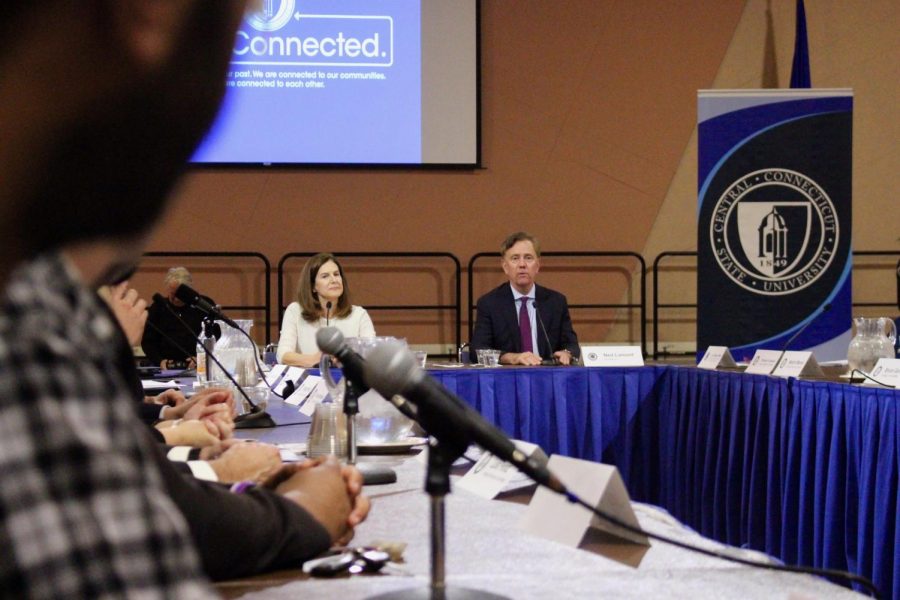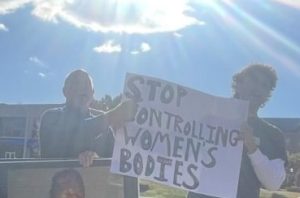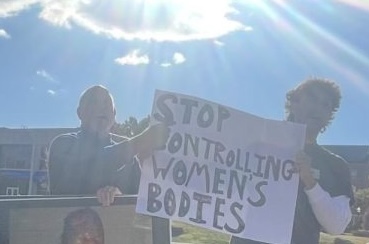Lamont Talks Textbook Tax, Tuition At CCSU
April 23, 2019
From a proposed “textbook tax” to the 5 percent tuition increase imposed by the Board of Regents, Central Connecticut students’ wallets have a lot to be concerned about.
But at a private meeting evaluating his first 100 days in office with his transition team in Alumni Hall last week, Governor Ned Lamont addressed those worries, reaffirming his need to apply the textbook tax and expressing sympathy on the tuition increase.
“I’ll take the heat on this one,” Lamont said when asked by The Recorder about whether he will still follow through with the textbook tax’s implementation. “I was the person that said, ‘Look, I’d like to hold the rate, not increase the sales tax rate, but expand the base to services and other things that have been tax exempt.'”
Lamont explained that, in order to revive the disappearing sales tax that “used to pay for most of our state government,” he will need to tax textbooks and other goods that are currently exempt like nonprescription drugs, bicycle helmets and sugary drinks, according to his proposed budget.
From Lamont’s point of view, it is “unfair” that the digital stores where most students buy their textbooks were not paying and collecting sales tax up until recently while local stores were, he said.
“That was why I thought it was a more reliable way to do things without having to raise rates,” Lamont stated.
However, he added, he is not oblivious to the “pushback” he’s receiving on the possible tax on textbooks and other proposed levies, and asked the Connecticut legislature to at least “hold the line” on the digital economy because he believes it “puts the physical economy at a real disadvantage.”
“There’s a fairness issue there. We’ll wait to hear back from the legislature on that pretty soon,” he said.
Pressed on the issue once more by CCSU senior and Student Government Association Senator Justin Boutin after the event, Lamont again emphasized expanding the sales tax base, with Lieutenant Governor Susan Bysiewicz encouraging Boutin to talk to his legislator and saying that “eventually we’ll figure it out.”
CCSU senior and SGA Senator Paige Sorenson brought the approved 5 percent tuition on the Connecticut State Colleges and Universities system’s schools to the governor’s attention, asking him what he knows about its enactment.
“I wish I could do more,” Lamont said. “The best investment we can make as a state is in terms of education. When it comes to tuition and education, despite this horrendous budget deficit, we held the line on public education.”
Lamont furthered that his administration will continue to put more money into education than was done in previous years, with some of the money also possibly going to “workforce development, CCSU and the community college system.”
“We’re gonna gradually get ourselves right to balance on this ship,” he said.
Sorenson said that she was “somewhat” satisfied with Lamont’s response, still troubled by the tuition increase’s burden.
“I get that we have to make up for lost revenue somehow because enrollment is down, but it’s targeting the most vulnerable students,” she commented.
Overall, Lamont said that even if some of his decisions on what to tax, education and other issues seem “controversial,” he is making them for Connecticut’s betterment.
“I’m asking people to make some tough choices and some of that involves sacrifice. I could really use your help to stand up and push a little bit because we’re pushing a bit uphill. It’s gonna make a difference,” Lamont said.










Richard Hershman, National Association of College Stores • Apr 26, 2019 at 11:08 am
The governor is incorrectly conflating two different issues in justifying his learning tax proposal. The issue of requiring remote online retailers to collect sales taxes like brick and mortar stores in CT has nothing to do with exempting college textbooks from sales tax, which applies to purchases from both physical and online sellers. The issue of allowing states to collect sales taxes owed but not historically collected by online retailers was resolved by the US Supreme Court. The governor is absolutely right on that issue and the need to collect sales taxes that are owed, but not collected by online retailers.
However, taxing textbooks in the state would not only harm students, but it would leave CT the only state of its neighbors to have a learning tax. It effectively will result in the state taxing very limited federal and other grant aid students need for their cost of attendance. The majority of states exempt textbooks from sales taxes. That places in state booksellers at a competitive disadvantage, not leveling the playing field as he suggested.